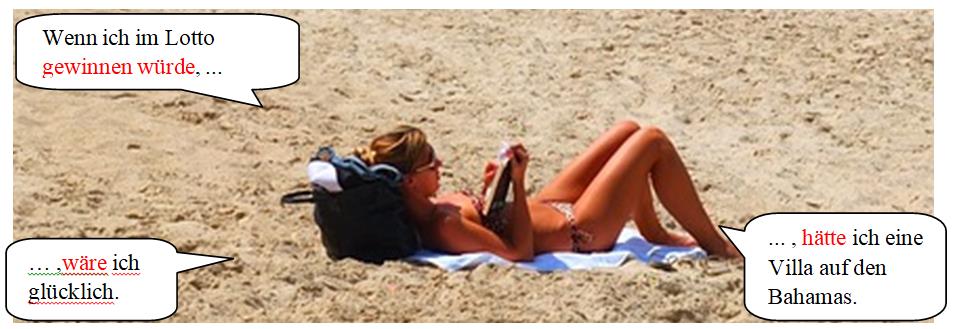In this lesson, you will learn what can be expressed with the subjunctive II, in which areas it can be used, and what it can mean.
Thank you for reading this post, don't forget to subscribe!CONTENTS
Kindness ▪ Desired sentences ▪ Conditional sentences ▪ sonst/ andernfalls ▪ Comparative sentences ▪ Consecutive and modal sentences ▪ Relative clauses ▪ fast / beinahe ▪ Concessive sentences ▪ Recommendations/suggestions ▪ Advice ▪ Do better ▪ Possibility ▪ müsste, düfte, könnte ▪ Surprise ▪ Questions with a tone of doubt ▪ Final statement/Conclusion ▪ Reported speech
The indicative serves to express an action that is real or we consider it to be so. The subjunctive expresses an action that is possible, uncertain, and therefore unrealistic. As the examples below show, there are a number of possible uses of the subjunctive II: it most often occurs in unrealistic conditional sentences. Sometimes the subjunctive II is used optionally over the indicative or the subjunctive I.
1. Kindness
With the Subjunctive II you can ask for something in a polite, attentive and restrained way – often in the form of a question. Direct requests seem more harsh and unkind.
For Example:
Bringen sie mir eine Tasse Kaffee!
Ich will die Rechnung!
Requests with the adverb gern are often in the II subjunctive II for the past but refer to the present.
For Example:
Ich hätte gern…. I would like to know….
Ich wüsste gern…/ Ich hätte gern gewusst , … I would like to know…/ I would like to have known
The subjunctive II is also used in polite phrases.
For Example:
Könnten / Würden Sie mir einen Gefallen tun und … – Could / Would you do me a favor and …
Wären Sie so freundlich/ nett, … – Would you be so kind/ nice, …
Würde es Ihnen etwas ausmachen … – Would you mind …
Here are examples in sentences:
Könnten Sie bitte das Fenster öffnen!- Could you please open the window!
Würden Sie bitte das Fenster öffnen! – Would you please open the window!
Dürfte ich Sie etwas fragen? – May I ask you something?
Wären Sie so nett, mir das noch einmal erklären.- Would you be so kind as to explain that to me again?
Hätten Sie einen Moment Zeit für mich? – Would you have a moment for me?
2. Desired sentences
For example:
Hätte ich doch nur die Wohnung aufgeräumt. – If only I had tidied up the apartment.
Wäre ich bloß nicht aufgewacht.- If only I hadn’t woken up!
3. Conditional sentences
For example:
Wenn ich mehr Geld hätte, würde ich ständig reisen. – If I had more money, I would travel all the time.
Wenn er weniger arbeiten würde, wäre er ausgeruht.- If he worked less, he would be rested.
4. Sentences with sonst/ andernfalls
For example:
Ich habe schnell reagiert, sonst hätte es einen schweren Unfall gegeben. – I reacted quickly, otherwise there would have been a serious accident
5. Comparative sentences
For example:
Er benimmt sich so, als ob er überhaupt keine Probleme hätte. – He behaves as if he has no problems at all.
6. Consecutive and Modal sentences
For example:
Er war zu müde, als dass er weiterfahren könnte. – He was too tired to drive any further.
7. Relative clauses after a negative statement
For example:
Es gibt keinen Menschen, der für ein so geringes Gehalt arbeiten würde. – There is no one who would work for such a low salary.
8. Sentences with fast / beinahe
For example:
Es wäre fast zu einer großen Katastrophe gekommen. – It almost turned into a major disaster.
Fast hätten wir keinen Flug mehr bekommen.- We almost didn’t get a flight anymore.
9. Concessive sentences
For example:
Auch wenn er der schönste Mann der Welt wäre, würde ich ihn nicht heiraten.- Even if he were the most beautiful man in the world, I wouldn’t marry him.
10. Recommendations/suggestions
For prepositions, können is used in the subjunctive II + INFINITIV.
For example:
Wir könnten ein Picknik machen.- We could make a picnic.
The past tense is mainly used for objections and complaints.
For example:
Wir hätten ein Picknik machen können, aber du hast ja nichts vorbereitet.- We could have had a picnic, but you didn’t prepare anything.
11. Advice
Here sollen is used in Subjunctive II + INFINITIV and an deiner Stelle + Subjunctive II
For example:
1. Wie wäre es, wenn wir dieses Mal pünktlich abreisen. – How about we leave on time this time?
2. An deiner Stelle würde ich nicht so viel arbeiten.- If I were you, I wouldn’t work so much.
3. Sie hätte das Verkehrszeichen beachten müssen sollen und hätte nicht so schnell fahren dürfen. – She should have observed the traffic sign and should not have been driving so fast.
4. Es wäre besser (gewesen), wenn wir nach der Party alles aufräumen würden. – It would have been better if we had cleaned everything up after the party.
The past tense is mainly used for objections and complaints.
For example:
Du hättest dich mehr bewegen sollen, dann hättest du jetzt keine Kopfschmerzen.- You should have moved more, then you wouldn’t have a headache now.
12. Do better
For example:
Ich würde nie so was tun. – I would never do something like that.
13. Possibility
For example:
Vielleicht hätte sie keine Zeit. – Maybe she wouldn’t have time.
14. Assumptions with müsste, dürfte, könnte
For example:
Oma müsste beim Fernsehen eingeschlafen sein. – Grandma must have fallen asleep while watching TV.
Das dürfte ihn ziemlich ärgern.- That should make him pretty angry.
15. Surprise
For example:
Ich hätte nicht gedacht, dass die Rettungsawagen so schnell am Unfallort ist.- I wouldn’t have thought that the ambulance would be at the scene of the accident so quickly.
16. Questions with a tone of doubt
For example:
Ob ich auch so reagiert hätte?- Would I have reacted in the same way?
17. Final statement/ Conclusion
For example:
Damit wären wir fertig. We would be done with that.
18. Reported speech
Whenever doubt is expressed about what is being said, the subjunctive II can be used, in the spoken language they are even preferred.
For example:
Mia behauptet, sie wäre immer aufmerksam. Mia claims that she is always attentive.
Sie behuptet, dass sie früher viele Freunde gehabt hätte. She insists that she would’ve used to have lots of friends.
See more:



